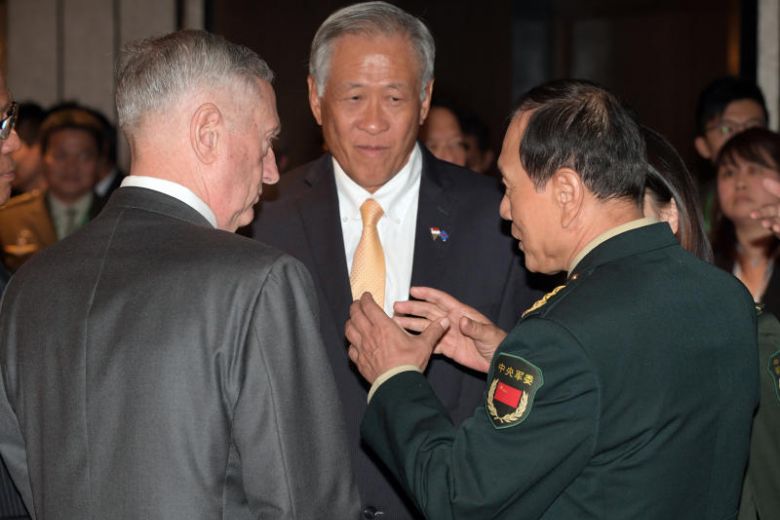Asean questions China, US over near-collision in South China Sea

US Secretary for Defense James Mattis (left), and China’s Minister of National Defense General Wei Fenghe (right) meet at a lunch hosted by Singapore Deputy Prime Minister Teo Chee Hean on Oct 20, 2018 at the Shangri-la Hotel Singapore. THE STRAITS TIMES PHOTO
SINGAPORE — Southeast Asian defense chiefs were worried enough about tensions between China and the US in the South China Sea to seek an explanation from the two powers at a just-concluded key security summit, and received some reassurance in return.
Speaking to reporters at the end of the Asean Defense Ministers’ Meeting (ADMM) and its expanded platform, the ADMM-Plus, Defense Minister Ng Eng Hen said a recent near-collision between a US warship and a Chinese destroyer in the disputed waters had been “too close for our comfort”.
“During our dialogue sessions, we didn’t hold back. We asked them pointedly: what happened between the two ships? Should we be worried? How is your relationship?” said Dr Ng.
“And just the very act of Asean asking, whether it’s Secretary Mattis or Defense Minister Wei, I think gives them pause to collect their thoughts, formulate strategies and place emphasis.”
Besides US Defense Secretary James Mattis and his Chinese counterpart, General Wei Fenghe, ministers from Russia, India, Japan, Australia, New Zealand and South Korea, were here for the annual summit. They make up the eight partners of the ADMM-Plus.
Article continues after this advertisementThe two men had cancelled a scheduled meeting in Beijing amid growing hostilities from both sides, but struck a conciliatory note when they met for 11/2 hours on the sidelines of the summit last Thursday.
Article continues after this advertisementEarlier this month, the US said a Chinese destroyer had come within 41m of the USS Decatur in the South China Sea in an “unsafe and unprofessional maneuver”, as the US warship conducted a freedom of navigation operation.
Dr Ng said Asean ministers were happy to hear both Mr Mattis and Gen Wei give the assurance that stability and security are at the top of their countries’ priorities.
He said he told Gen Wei that China needs a policy to respond to the freedom of navigation operations by the US without escalating tensions, “and I think he understood what I meant”.
The ministers and their dialogue partners also discussed the situation on the Korean Peninsula, the proliferation of weapons of mass destruction and cyber threats.
They emphasized in particular the importance of pursuing a peaceful resolution of disputes and respect for international law, such as the 1982 UN Convention on the Law of the Sea (Unclos), said Dr Ng.
Asean wants a speedy resolution to the ongoing negotiations over a code of conduct that will help countries navigate territorial disputes in the strategic and busy waterway, through which US$5.3 trillion (S$7.3 trillion) worth of trade passes each year.
Asean countries such as Vietnam, Brunei, Malaysia and the Philippines all have overlapping claims with China in the area.
Dr Ng acknowledged that care had to be taken to conduct the first Asean-China maritime exercise next week in undisputed waters, and that the same principle applies to next year’s inaugural Asean-US maritime exercise, which will be held in Asean waters.
“That’s only sensible. You’re out to conduct an exercise, not to raise tensions,” said Dr Ng.